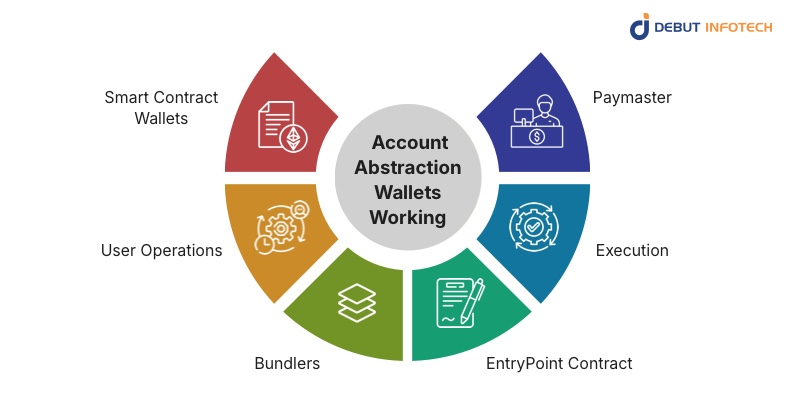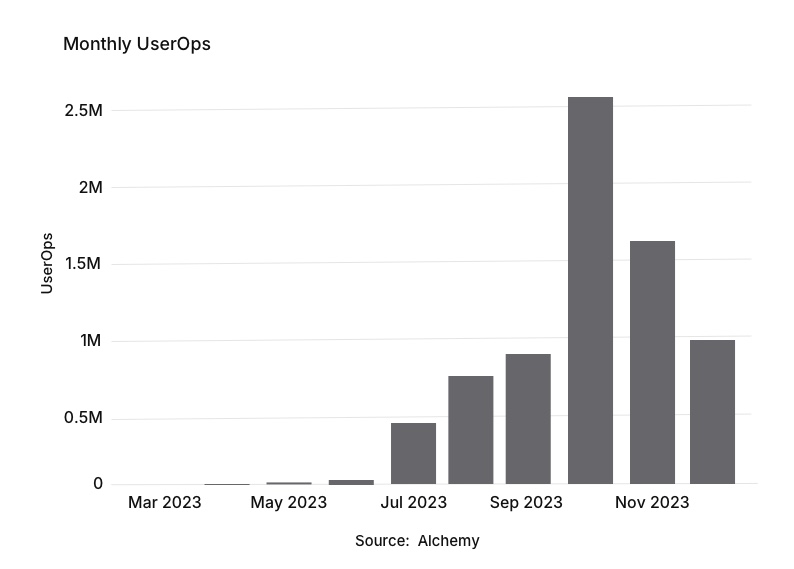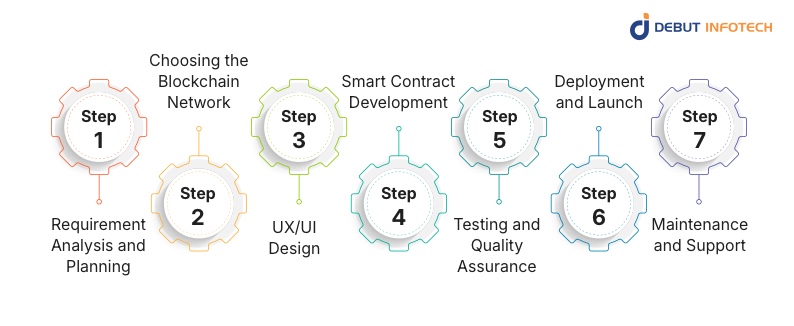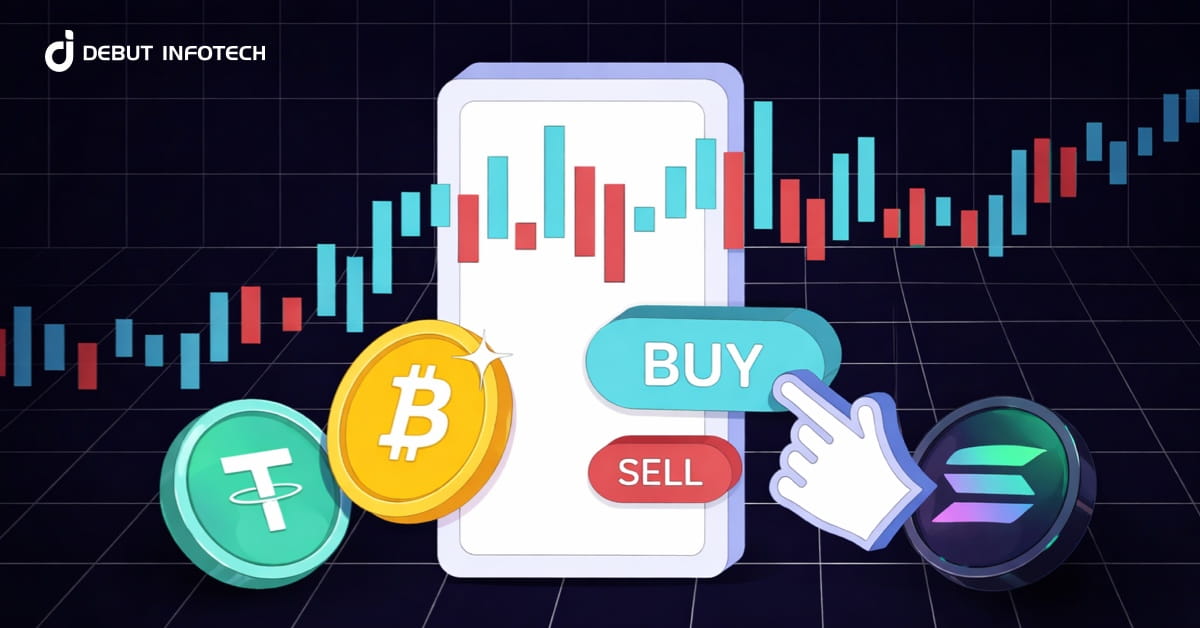Table of Contents
Home / Blog / Cryptocurrency
Building an Account Abstraction Crypto Wallet: Features, Benefits, and Development Guide
November 5, 2025

November 5, 2025
An Account Abstraction Crypto Wallet redefines how users interact with blockchain by replacing traditional private-key systems with programmable smart contracts that manage authentication, recovery, and automation. This approach enhances security, simplifies transactions, and enables gasless interactions. According to Alchemy, over 960,000 smart accounts were deployed in Q4 2023, accounting for 53% of the total ERC-4337 wallets.
Another Alchemy report notes 730,000+ active smart accounts across Ethereum, Arbitrum, and Polygon. Account abstraction crypto wallet development focuses on building these flexible, user-centric wallets that automate complex blockchain operations, making digital asset management faster, safer, and more accessible for mainstream adoption.
In this guide, we will discuss what you need to know about account abstraction crypto wallets, their development process, benefits, key features, and challenges.
Launch Your Own Account Abstraction Wallet
Turn your crypto vision into a working product. We design secure, scalable, and user-friendly wallets powered by Ethereum’s account abstraction model.
What Is an Account Abstraction Wallet?
Account abstraction wallets are crypto wallets that replace traditional externally owned accounts (EOAs) with smart contract–based accounts. Instead of relying on a single private key for authorization, they use programmable logic to define how transactions are approved and executed. This shift simplifies user interactions, reduces dependency on seed phrases, and opens the door to more flexible and secure account management.
How Account Abstraction Wallets Work

Here’s a step-by-step guide on how account abstraction wallets work on blockchain:
1. Smart Contract Wallets
At the core of account abstraction is the smart contract wallet. Unlike traditional wallets, smart contract wallets can include custom authorization logic. They act as programmable accounts that can be tailored to different security needs, making them adaptable to both individual users and enterprises.
2. UserOperations
Instead of sending transactions directly to the blockchain, account abstraction uses “UserOperations.” These are structured data packages that define what the wallet wants to execute. This design makes transaction handling more flexible, allowing users to batch multiple actions in a single submission or delegate execution to a third party.
3. Bundlers
Bundlers are specialized nodes that collect UserOperations and submit them to the EntryPoint contract. They help reduce network congestion and improve efficiency by combining multiple operations. Bundlers also enable users to transact without holding the native gas token, as they can be compensated through alternative methods.
4. EntryPoint Contract
The EntryPoint contract serves as the central processing hub for UserOperations. It validates requests, enforces security rules, and manages the flow of transactions between the wallet and the network. This structure ensures that operations are handled in a standardized way across different applications.
5. Execution
Once the EntryPoint verifies a UserOperation, the wallet executes the predefined logic. This can include token transfers, smart contract calls, or more advanced automated workflows. Because the rules are coded into the wallet itself, users receive faster and more reliable transaction processing without the need for constant manual approvals.
6. Paymaster
Paymasters handle transaction fees on behalf of users. They enable gasless transactions by covering gas costs in exchange for another asset or service. This lowers the entry barrier for new users and simplifies the onboarding process for non-technical participants.
What Is Account Abstraction (AA) Wallet Development?
Account abstraction wallet development involves building programmable wallets that follow the ERC-4337 standard. These wallets eliminate the need for EOAs, introducing flexible authentication, transaction automation, and custom access controls. Developers use smart contracts, bundlers, and paymasters to deliver advanced wallet functionalities without modifying the base blockchain protocol.
Key Technologies and Standards

Here are the major technologies and standards in account abstraction development:
1. ERC-4337
ERC-4337 is the core standard powering Account Abstraction wallets. It introduces a smart contract-based transaction model that replaces externally owned accounts with programmable logic. By standardizing UserOperations, bundlers, and the EntryPoint contract, ERC-4337 enables flexible account control, automation, and enhanced user experiences without requiring consensus-level blockchain changes.
2. Factory Contracts
Factory contracts automate the deployment of smart contract wallets, allowing developers to generate consistent and secure wallet instances efficiently. This standardization improves scalability and reduces deployment errors. It also simplifies wallet creation for new users, helping developers onboard thousands of users while maintaining predictable and uniform wallet logic.
3. Paymasters
Paymasters make gasless transactions possible by covering gas fees on behalf of users. They enable flexible payment models, such as using stablecoins or tokens for gas instead of the native currency. This feature improves accessibility, especially for new users unfamiliar with blockchain transaction fees and gas management.
4. Bundlers
Bundlers are specialized nodes that collect UserOperations, validate them, and forward them to the EntryPoint contract. They improve efficiency by grouping multiple operations into one block submission. This reduces transaction congestion, enhances scalability, and supports the goal of account abstraction to provide faster, cheaper, and more user-friendly blockchain interactions.
Key Features and Benefits of Account Abstraction Wallet Development
1. High Security
Account abstraction wallets use programmable smart contracts that allow multiple verification layers, session keys, and transaction limits. This minimizes dependence on a single private key, preventing unauthorized access and reducing risks associated with phishing or key theft. Users gain stronger control and safer interactions with decentralized applications.
2. Account Recovery Options in Case of Key Loss
Unlike traditional wallets, where losing a private key results in the permanent loss of funds, blockchain account abstraction wallets support recovery through social recovery mechanisms or hardware backups. Users can appoint trusted contacts or recovery agents, allowing access to be restored in the event of loss without compromising the overall security of their decentralized wallet.
3. Transaction Aggregation
Account abstraction enables users to bundle multiple actions—such as token transfers, staking, or contract executions—into a single transaction. This feature improves on-chain efficiency, reduces gas consumption, and simplifies user operations. It also makes complex DeFi interactions more accessible to users who prefer a single, unified process.
4. Extensive User Experience Enhancements
Account abstraction wallets simplify blockchain interactions through gasless transactions, automatic fee payments, and intuitive permission systems. They allow seamless DApp integration and faster transaction confirmations, improving accessibility for non-technical users. The result is a smoother and more intuitive experience compared to standard wallet systems.
5. Scheduled and Batch Transactions
Users can automate specific operations, such as sending recurring payments, executing trades at specific times, or performing multiple transfers in a single batch. This adds convenience and control, making blockchain use more practical for individuals and businesses managing frequent or time-sensitive transactions.
6. Transaction Automation
Account abstraction wallets support automation through predefined rules that trigger actions based on specific conditions—such as price thresholds or time intervals. This enables recurring payments, automated staking, and asset management, eliminating the need for manual inputs and providing users with greater flexibility and reliability in managing their crypto activities.
7. Alternative Signature Schemes
These wallets can integrate signature methods, such as biometrics, passkeys, or two-factor authentication. Moving beyond private keys enhances both accessibility and security, allowing for authentication methods tailored to individual user preferences. This makes blockchain wallets more aligned with modern authentication standards used in mainstream applications.
Crucial Differences from Traditional Crypto Wallet Development
1. Private Key Management vs. Flexible Access Controls
Traditional crypto wallets depend entirely on a single private key for security. The private key acts as the sole access credential, meaning any loss or exposure can permanently compromise funds. Users must manually manage backups and seed phrases, which increases the risk of human error and asset loss.
In contrast, Account abstraction wallets replace the rigid private key model with programmable access rules, allowing for more flexible control over access. They allow flexible authentication through social recovery, session keys, or biometric verification. This approach decentralizes control, improves recoverability, and reduces user responsibility while maintaining robust on-chain security through smart contract–based authorization logic.
2. One-Size-Fits-All vs. Custom Permissions
Standard wallets apply uniform permissions for all transactions, offering no distinction between routine transfers and high-value operations. Every transaction demands full approval through the same private key, limiting security customization and creating a user experience that’s identical across different platforms, regardless of transaction size or sensitivity.
On the other hand, Account abstraction wallets introduce configurable permissions, allowing users to define how each type of transaction is authorized. For instance, small transfers might use single approval, while larger transactions require multiple signatures. This adaptability allows greater flexibility, especially for businesses or users managing multiple assets under varied access policies.
3. High Entry Barriers vs. Enhanced User Experience
Conventional crypto wallets often intimidate new users with seed phrases, gas fees, and complex signing procedures. The learning curve is steep, and even a minor mistake can result in irreversible consequences. These barriers discourage mainstream adoption, keeping blockchain interactions limited to technically savvy individuals.
In contrast, Account abstraction wallets hide blockchain complexity behind smooth, user-friendly designs. They enable gasless transactions, automatic fee sponsorship through paymasters, and simple recovery options. Users interact with wallets in a manner similar to traditional finance apps, making blockchain usage more inclusive, accessible, and aligned with modern digital experiences.
The Account Abstraction Wallet Development Process

Here is a guide on how to develop an account abstraction crypto wallet:
1. Requirement Analysis and Planning
Tech companies offering cryptocurrency development services begin by analyzing the project’s technical goals, user requirements, and target blockchain ecosystem. This phase identifies security measures, desired features, and integration points. It ensures the development process aligns with regulatory standards, usability expectations, and long-term scalability before moving into design or coding stages.
2. Choosing the Blockchain Network
Selecting the right blockchain is crucial, as not all networks fully support the ERC-4337 infrastructure. Developers evaluate options based on gas efficiency, ecosystem maturity, scalability, and support for bundlers and paymasters. The chosen network affects both wallet performance and the accessibility of account abstraction features.
3. UX/UI Design
The wallet interface is designed to simplify blockchain interaction for everyday users. Developers focus on intuitive layouts, seamless navigation, and straightforward transaction confirmations. A transparent and user-centric interface ensures that even those new to blockchain can securely interact with their assets without technical confusion.
4. Smart Contract Development
Developers create the wallet’s underlying smart contracts, defining custom authorization logic, recovery processes, and transaction automation. These contracts determine how users interact with their accounts and how operations are validated. The focus is on writing clean, secure, and efficient code to minimize risks and ensure reliability.
5. Testing and Quality Assurance
Testing verifies that the abstract wallet crypto performs accurately under different network conditions. It includes security audits, stress testing, and transaction simulations. The goal is to identify vulnerabilities, confirm gas efficiency, and validate recovery features before public deployment, ensuring the system’s integrity and reliability across all use cases.
6. Deployment and Launch
Once testing is complete, developers deploy the smart contracts and front-end interface to the blockchain network. This stage includes setting up the EntryPoint, bundlers, and paymasters. After deployment, the wallet becomes accessible to users, allowing real-time account abstraction operations through a secure and polished environment.
7. Maintenance and Support
Continuous maintenance ensures the wallet remains secure and compatible with network upgrades. Developers or top crypto companies perform regular code reviews, add new features, and fix bugs as they arise. Ongoing support helps sustain performance and ensures users continue to enjoy seamless account abstraction experiences as standards evolve.
Challenges of Account Abstraction Crypto Wallet Development
Here are some challenges associated with account abstraction crypto wallet development:
1. Complex Implementation
Developing account abstraction wallets requires advanced knowledge of smart contracts, ERC-4337 infrastructure, and on-chain logic. Integrating bundlers, paymasters, and custom authorization rules increases development complexity. Teams must coordinate across multiple components while maintaining performance and security, which often extends project timelines and demands higher technical expertise.
2. Potential Security Risks
The flexibility of programmable wallets introduces additional attack vectors. Bugs in smart contracts or misconfigured access rules can expose vulnerabilities that hackers may exploit. Regular audits, code reviews, and formal verification are essential to ensure that complex wallet logic does not compromise funds or system integrity.
3. Higher Gas Costs
Account abstraction wallets typically require multiple contract interactions per transaction, resulting in increased gas usage compared to standard wallets. This can make frequent transactions costly for users. A reliable developer or crypto development company can mitigate this through optimized contract design, paymasters that cover fees, or bundlers that batch operations for more efficient execution.
4. Compatibility Issues
Not all blockchain networks support ERC-4337 or its infrastructure components, such as bundlers and paymasters. This limits where developers can deploy account abstraction wallets. Ensuring full compatibility often involves custom adjustments, which adds extra time and cost to development while constraining the wallet’s cross-chain usability.
5. Need for Extensive User Education
Account abstraction introduces new wallet mechanics that are unfamiliar to traditional cryptocurrency users. Features like recovery agents, gasless transactions, or conditional approvals require proper understanding. Developers must invest in user education through tutorials, onboarding guides, and intuitive design to facilitate smoother adoption and prevent costly user errors.
Why Choose Debut Infotech for Account Abstraction Crypto Wallet Development
Debut Infotech has built a strong reputation as a leading blockchain development company specializing in account abstraction crypto wallet solutions. We focus on delivering secure, intuitive, and scalable white label crypto wallet systems that simplify complex blockchain interactions. With a team skilled in smart contract automation, multi-chain integrations, and advanced authentication layers, we help businesses build next-gen wallets that align with the ERC-4337 standard and beyond.
Here’s why we’re a strong fit for your project:
- Proven experience in ERC-4337 and modular smart contract architecture
- Custom wallet design with gasless transaction support
- End-to-end development, from design to deployment
- Strong focus on performance, compliance, and long-term scalability
Partner with a Leading Abstraction Wallet Company
Collaborate with a team that understands blockchain deeply. We build wallets that combine performance, flexibility, and security for modern crypto users.
Conclusion
Account abstraction crypto wallets are reshaping blockchain access by combining programmable security, automated transactions, and simpler recovery flows. They reduce reliance on single private keys while enabling a gasless user experience, batched operations, and custom permissions suited to both everyday users and enterprises alike.
Developers building these wallets unlock flexible authentication, paymasters, and bundlers to improve efficiency and inclusion.
As standards like ERC-4337 mature and tooling improves, account abstraction will be pivotal for mainstream Web3 adoption, offering practical, secure, and user-friendly ownership of digital assets.
FAQs
A. A good example is smart contract wallets like Argent or Safe. They use account abstraction to enable users to recover access without seed phrases, set daily spending limits, and even utilise social recovery. It provides users with flexibility and security that surpasses what traditional crypto wallets offer.
A. Think of gaming platforms or NFT marketplaces. With account abstraction, users can sign in using biometrics or social logins, and transactions can be paid in stablecoins instead of ETH. It makes blockchain interaction simpler for people who aren’t crypto experts.
A. Account abstraction wallets handle multiple chains smoothly. You can use one wallet to interact with Ethereum, Polygon, or BNB Chain without switching apps or juggling gas tokens. It saves time, cuts friction, and makes managing assets across networks way easier.
A. It starts when a user triggers a transaction. The wallet packages it as a “UserOperation,” which gets sent to a bundler. The bundler submits it to the EntryPoint contract that checks validity, executes it, and charges fees. This all happens automatically behind the scenes.
A. The cost depends on features and integrations. A basic wallet might cost around $25,000 to $40,000. In contrast, advanced ones with multi-chain support, custom UIs, and social recovery can go up to $100,000 or more. Customization, testing, and security audits usually drive the price.



Leave a Comment